Contract Law: Australian Contract Law Principles and Torts
VerifiedAdded on 2019/11/19
|12
|2540
|214
Homework Assignment
AI Summary
This assignment delves into the core principles of Australian contract law, examining the essential elements required for a legally binding contract, including agreement, consideration, capacity, intention, formalities, and certainty. It differentiates between written and oral contracts, highlighting their enforceability and associated challenges. The assignment also explores formal contracts, such as contracts by deed, and their unique characteristics. Furthermore, it analyzes agreements within social and domestic relationships, differentiating them from legally binding contracts, using lottery ticket purchase scenarios as examples. Finally, it discusses vicarious liability, particularly the relationship between a principal and agent versus an independent contractor, as it relates to tort law, referencing relevant Australian legislation and case law to illustrate key concepts and distinctions. This assignment is a great resource for students studying contract law, providing a solid foundation in the subject.
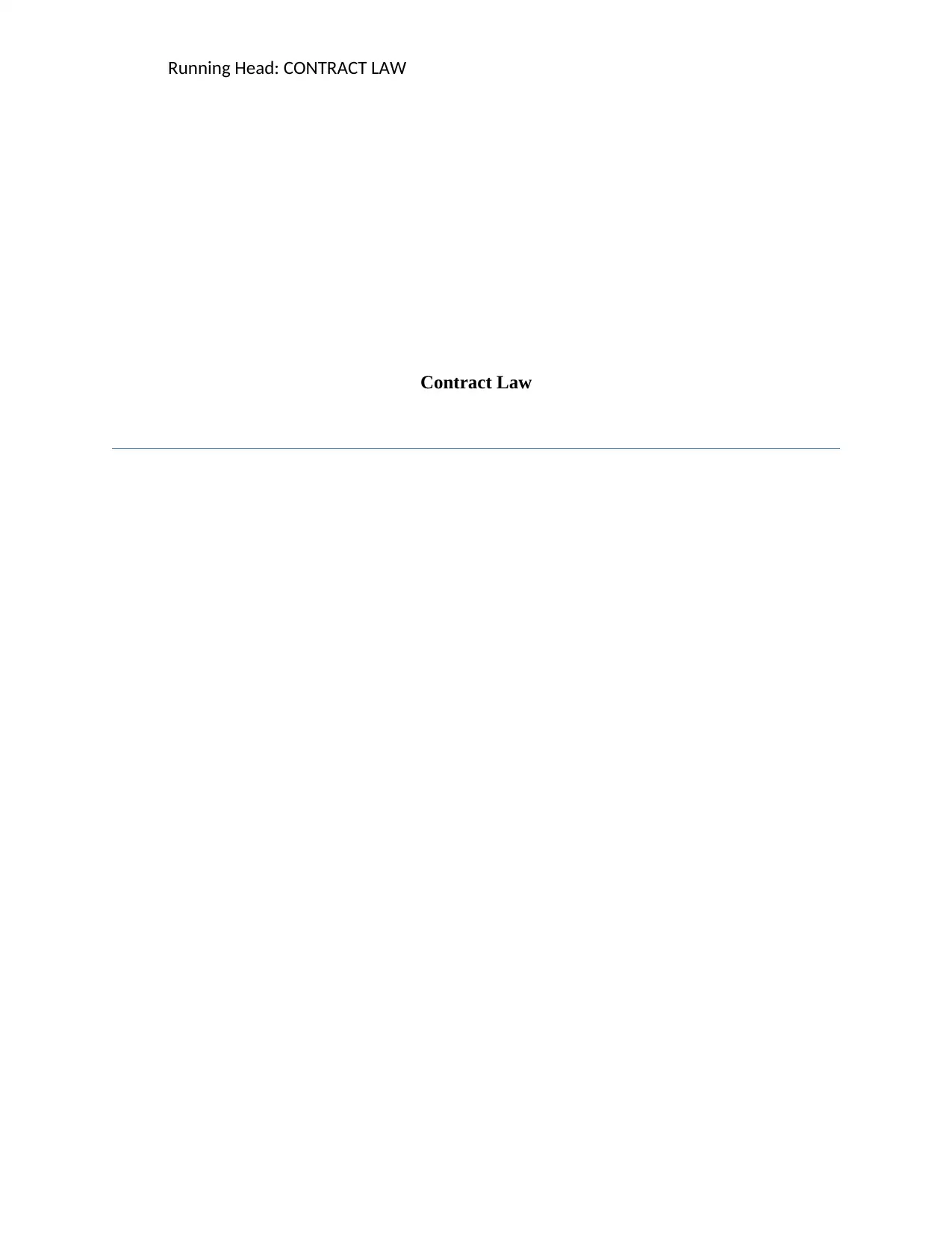
Running Head: CONTRACT LAW
Contract Law
Contract Law
Paraphrase This Document
Need a fresh take? Get an instant paraphrase of this document with our AI Paraphraser
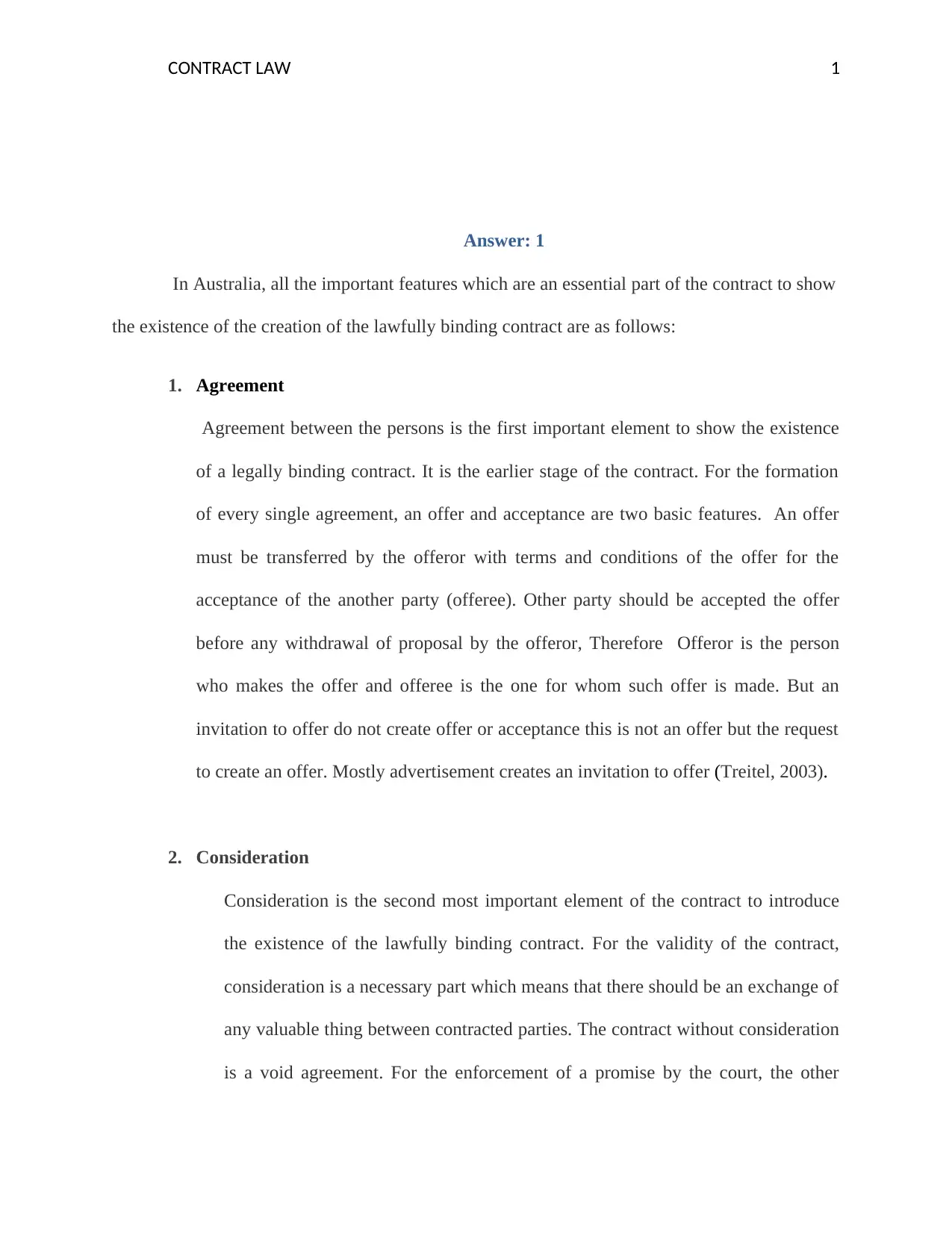
CONTRACT LAW 1
Answer: 1
In Australia, all the important features which are an essential part of the contract to show
the existence of the creation of the lawfully binding contract are as follows:
1. Agreement
Agreement between the persons is the first important element to show the existence
of a legally binding contract. It is the earlier stage of the contract. For the formation
of every single agreement, an offer and acceptance are two basic features. An offer
must be transferred by the offeror with terms and conditions of the offer for the
acceptance of the another party (offeree). Other party should be accepted the offer
before any withdrawal of proposal by the offeror, Therefore Offeror is the person
who makes the offer and offeree is the one for whom such offer is made. But an
invitation to offer do not create offer or acceptance this is not an offer but the request
to create an offer. Mostly advertisement creates an invitation to offer (Treitel, 2003).
2. Consideration
Consideration is the second most important element of the contract to introduce
the existence of the lawfully binding contract. For the validity of the contract,
consideration is a necessary part which means that there should be an exchange of
any valuable thing between contracted parties. The contract without consideration
is a void agreement. For the enforcement of a promise by the court, the other
Answer: 1
In Australia, all the important features which are an essential part of the contract to show
the existence of the creation of the lawfully binding contract are as follows:
1. Agreement
Agreement between the persons is the first important element to show the existence
of a legally binding contract. It is the earlier stage of the contract. For the formation
of every single agreement, an offer and acceptance are two basic features. An offer
must be transferred by the offeror with terms and conditions of the offer for the
acceptance of the another party (offeree). Other party should be accepted the offer
before any withdrawal of proposal by the offeror, Therefore Offeror is the person
who makes the offer and offeree is the one for whom such offer is made. But an
invitation to offer do not create offer or acceptance this is not an offer but the request
to create an offer. Mostly advertisement creates an invitation to offer (Treitel, 2003).
2. Consideration
Consideration is the second most important element of the contract to introduce
the existence of the lawfully binding contract. For the validity of the contract,
consideration is a necessary part which means that there should be an exchange of
any valuable thing between contracted parties. The contract without consideration
is a void agreement. For the enforcement of a promise by the court, the other
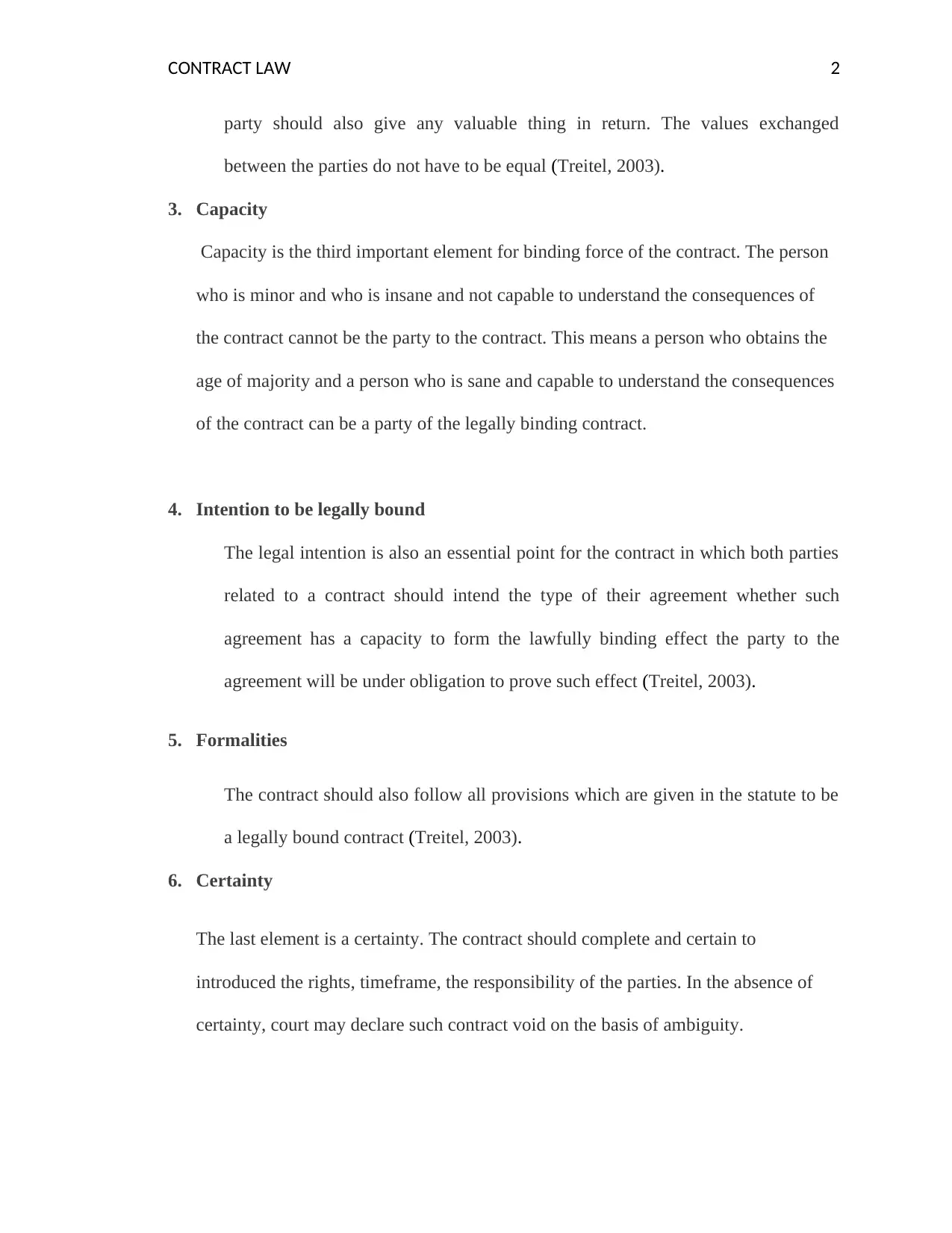
CONTRACT LAW 2
party should also give any valuable thing in return. The values exchanged
between the parties do not have to be equal (Treitel, 2003).
3. Capacity
Capacity is the third important element for binding force of the contract. The person
who is minor and who is insane and not capable to understand the consequences of
the contract cannot be the party to the contract. This means a person who obtains the
age of majority and a person who is sane and capable to understand the consequences
of the contract can be a party of the legally binding contract.
4. Intention to be legally bound
The legal intention is also an essential point for the contract in which both parties
related to a contract should intend the type of their agreement whether such
agreement has a capacity to form the lawfully binding effect the party to the
agreement will be under obligation to prove such effect (Treitel, 2003).
5. Formalities
The contract should also follow all provisions which are given in the statute to be
a legally bound contract (Treitel, 2003).
6. Certainty
The last element is a certainty. The contract should complete and certain to
introduced the rights, timeframe, the responsibility of the parties. In the absence of
certainty, court may declare such contract void on the basis of ambiguity.
party should also give any valuable thing in return. The values exchanged
between the parties do not have to be equal (Treitel, 2003).
3. Capacity
Capacity is the third important element for binding force of the contract. The person
who is minor and who is insane and not capable to understand the consequences of
the contract cannot be the party to the contract. This means a person who obtains the
age of majority and a person who is sane and capable to understand the consequences
of the contract can be a party of the legally binding contract.
4. Intention to be legally bound
The legal intention is also an essential point for the contract in which both parties
related to a contract should intend the type of their agreement whether such
agreement has a capacity to form the lawfully binding effect the party to the
agreement will be under obligation to prove such effect (Treitel, 2003).
5. Formalities
The contract should also follow all provisions which are given in the statute to be
a legally bound contract (Treitel, 2003).
6. Certainty
The last element is a certainty. The contract should complete and certain to
introduced the rights, timeframe, the responsibility of the parties. In the absence of
certainty, court may declare such contract void on the basis of ambiguity.
⊘ This is a preview!⊘
Do you want full access?
Subscribe today to unlock all pages.

Trusted by 1+ million students worldwide
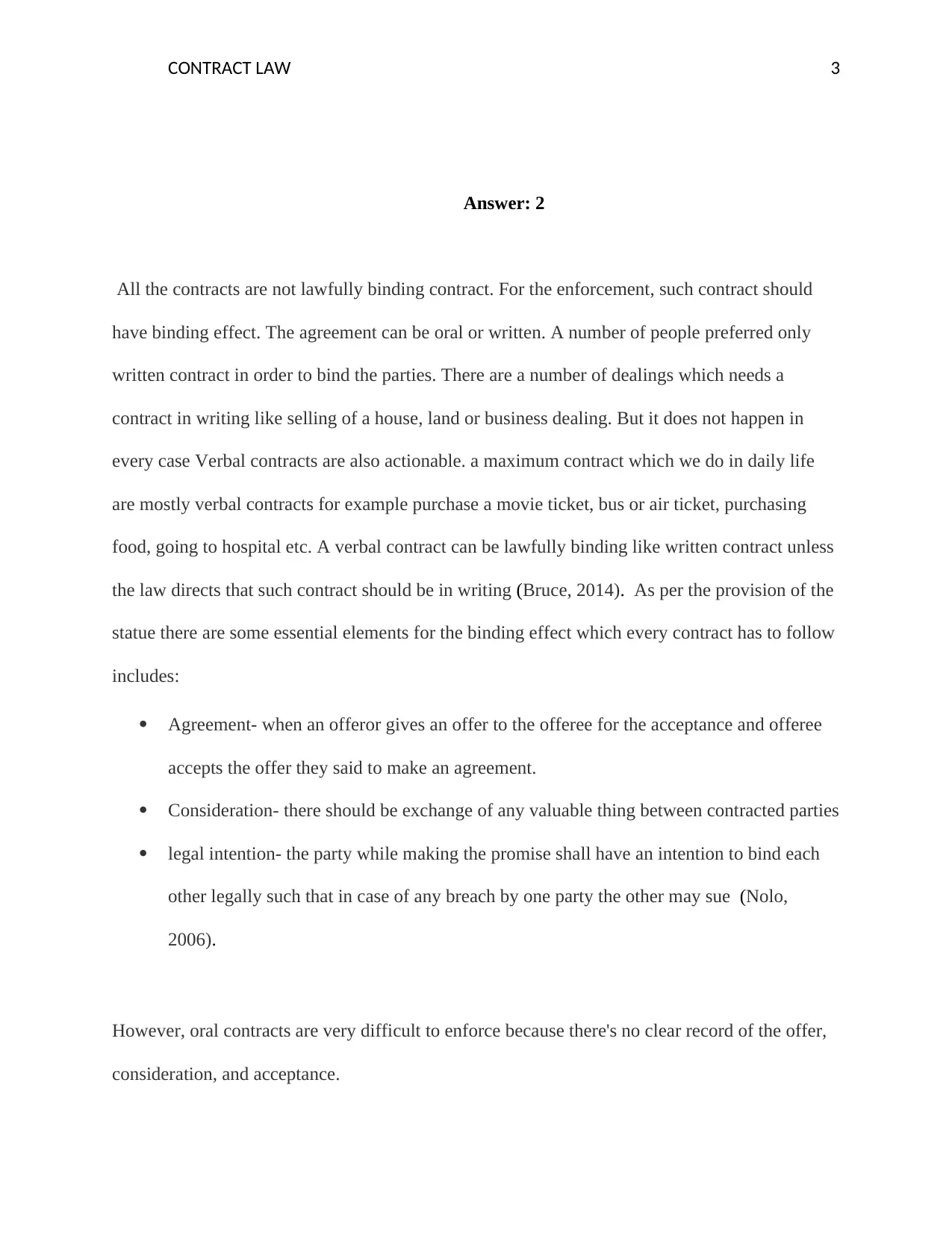
CONTRACT LAW 3
Answer: 2
All the contracts are not lawfully binding contract. For the enforcement, such contract should
have binding effect. The agreement can be oral or written. A number of people preferred only
written contract in order to bind the parties. There are a number of dealings which needs a
contract in writing like selling of a house, land or business dealing. But it does not happen in
every case Verbal contracts are also actionable. a maximum contract which we do in daily life
are mostly verbal contracts for example purchase a movie ticket, bus or air ticket, purchasing
food, going to hospital etc. A verbal contract can be lawfully binding like written contract unless
the law directs that such contract should be in writing (Bruce, 2014). As per the provision of the
statue there are some essential elements for the binding effect which every contract has to follow
includes:
Agreement- when an offeror gives an offer to the offeree for the acceptance and offeree
accepts the offer they said to make an agreement.
Consideration- there should be exchange of any valuable thing between contracted parties
legal intention- the party while making the promise shall have an intention to bind each
other legally such that in case of any breach by one party the other may sue (Nolo,
2006).
However, oral contracts are very difficult to enforce because there's no clear record of the offer,
consideration, and acceptance.
Answer: 2
All the contracts are not lawfully binding contract. For the enforcement, such contract should
have binding effect. The agreement can be oral or written. A number of people preferred only
written contract in order to bind the parties. There are a number of dealings which needs a
contract in writing like selling of a house, land or business dealing. But it does not happen in
every case Verbal contracts are also actionable. a maximum contract which we do in daily life
are mostly verbal contracts for example purchase a movie ticket, bus or air ticket, purchasing
food, going to hospital etc. A verbal contract can be lawfully binding like written contract unless
the law directs that such contract should be in writing (Bruce, 2014). As per the provision of the
statue there are some essential elements for the binding effect which every contract has to follow
includes:
Agreement- when an offeror gives an offer to the offeree for the acceptance and offeree
accepts the offer they said to make an agreement.
Consideration- there should be exchange of any valuable thing between contracted parties
legal intention- the party while making the promise shall have an intention to bind each
other legally such that in case of any breach by one party the other may sue (Nolo,
2006).
However, oral contracts are very difficult to enforce because there's no clear record of the offer,
consideration, and acceptance.
Paraphrase This Document
Need a fresh take? Get an instant paraphrase of this document with our AI Paraphraser
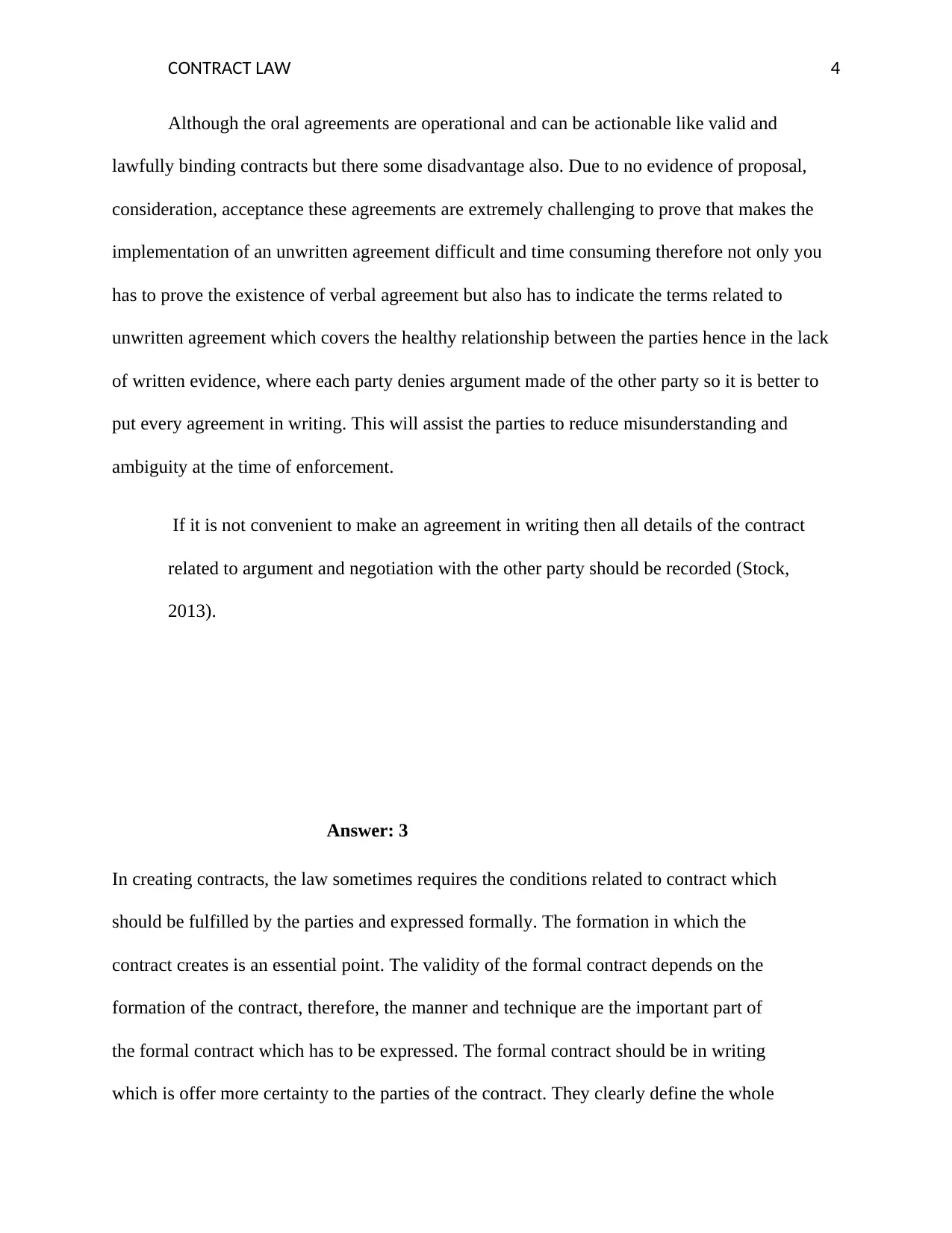
CONTRACT LAW 4
Although the oral agreements are operational and can be actionable like valid and
lawfully binding contracts but there some disadvantage also. Due to no evidence of proposal,
consideration, acceptance these agreements are extremely challenging to prove that makes the
implementation of an unwritten agreement difficult and time consuming therefore not only you
has to prove the existence of verbal agreement but also has to indicate the terms related to
unwritten agreement which covers the healthy relationship between the parties hence in the lack
of written evidence, where each party denies argument made of the other party so it is better to
put every agreement in writing. This will assist the parties to reduce misunderstanding and
ambiguity at the time of enforcement.
If it is not convenient to make an agreement in writing then all details of the contract
related to argument and negotiation with the other party should be recorded (Stock,
2013).
Answer: 3
In creating contracts, the law sometimes requires the conditions related to contract which
should be fulfilled by the parties and expressed formally. The formation in which the
contract creates is an essential point. The validity of the formal contract depends on the
formation of the contract, therefore, the manner and technique are the important part of
the formal contract which has to be expressed. The formal contract should be in writing
which is offer more certainty to the parties of the contract. They clearly define the whole
Although the oral agreements are operational and can be actionable like valid and
lawfully binding contracts but there some disadvantage also. Due to no evidence of proposal,
consideration, acceptance these agreements are extremely challenging to prove that makes the
implementation of an unwritten agreement difficult and time consuming therefore not only you
has to prove the existence of verbal agreement but also has to indicate the terms related to
unwritten agreement which covers the healthy relationship between the parties hence in the lack
of written evidence, where each party denies argument made of the other party so it is better to
put every agreement in writing. This will assist the parties to reduce misunderstanding and
ambiguity at the time of enforcement.
If it is not convenient to make an agreement in writing then all details of the contract
related to argument and negotiation with the other party should be recorded (Stock,
2013).
Answer: 3
In creating contracts, the law sometimes requires the conditions related to contract which
should be fulfilled by the parties and expressed formally. The formation in which the
contract creates is an essential point. The validity of the formal contract depends on the
formation of the contract, therefore, the manner and technique are the important part of
the formal contract which has to be expressed. The formal contract should be in writing
which is offer more certainty to the parties of the contract. They clearly define the whole
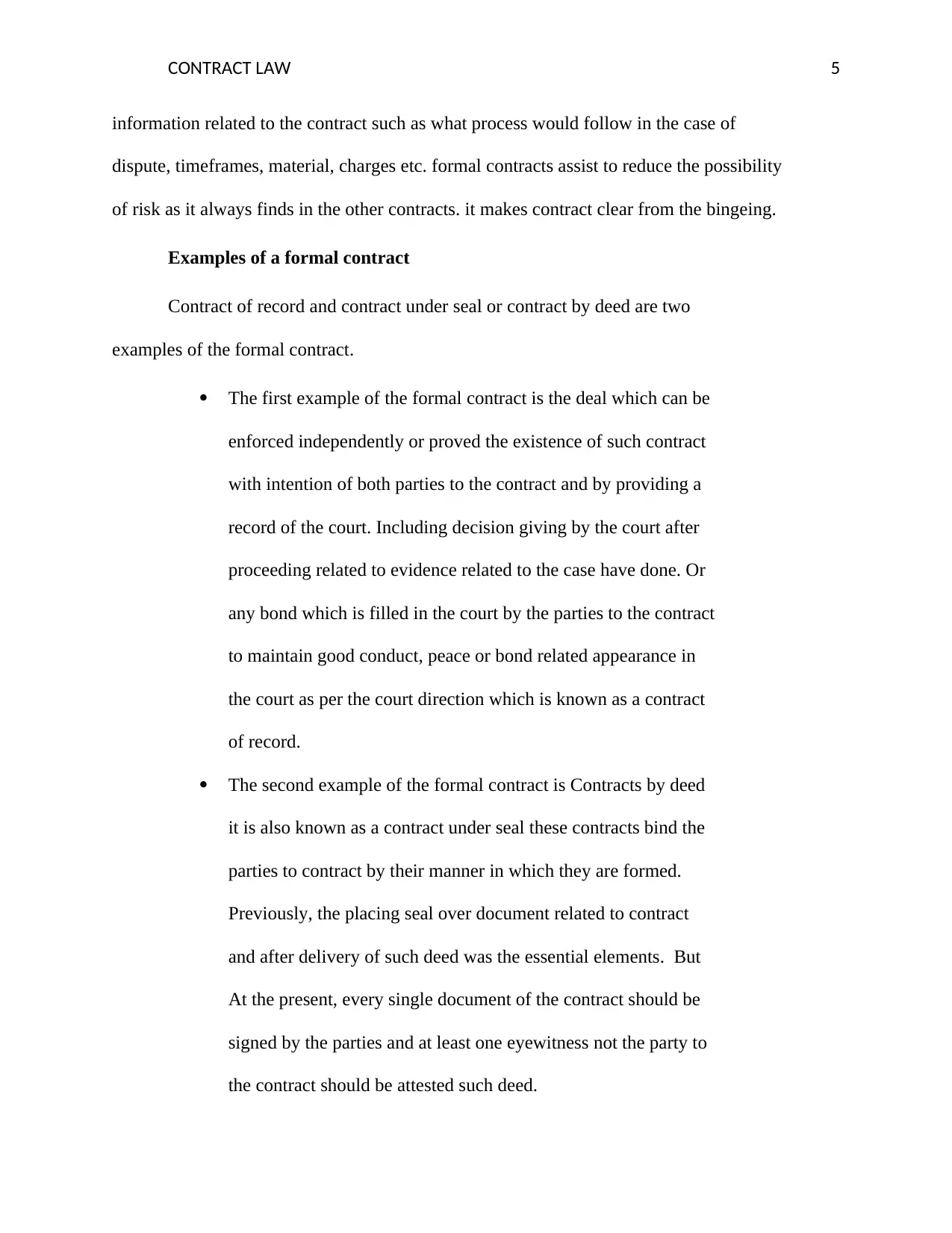
CONTRACT LAW 5
information related to the contract such as what process would follow in the case of
dispute, timeframes, material, charges etc. formal contracts assist to reduce the possibility
of risk as it always finds in the other contracts. it makes contract clear from the bingeing.
Examples of a formal contract
Contract of record and contract under seal or contract by deed are two
examples of the formal contract.
The first example of the formal contract is the deal which can be
enforced independently or proved the existence of such contract
with intention of both parties to the contract and by providing a
record of the court. Including decision giving by the court after
proceeding related to evidence related to the case have done. Or
any bond which is filled in the court by the parties to the contract
to maintain good conduct, peace or bond related appearance in
the court as per the court direction which is known as a contract
of record.
The second example of the formal contract is Contracts by deed
it is also known as a contract under seal these contracts bind the
parties to contract by their manner in which they are formed.
Previously, the placing seal over document related to contract
and after delivery of such deed was the essential elements. But
At the present, every single document of the contract should be
signed by the parties and at least one eyewitness not the party to
the contract should be attested such deed.
information related to the contract such as what process would follow in the case of
dispute, timeframes, material, charges etc. formal contracts assist to reduce the possibility
of risk as it always finds in the other contracts. it makes contract clear from the bingeing.
Examples of a formal contract
Contract of record and contract under seal or contract by deed are two
examples of the formal contract.
The first example of the formal contract is the deal which can be
enforced independently or proved the existence of such contract
with intention of both parties to the contract and by providing a
record of the court. Including decision giving by the court after
proceeding related to evidence related to the case have done. Or
any bond which is filled in the court by the parties to the contract
to maintain good conduct, peace or bond related appearance in
the court as per the court direction which is known as a contract
of record.
The second example of the formal contract is Contracts by deed
it is also known as a contract under seal these contracts bind the
parties to contract by their manner in which they are formed.
Previously, the placing seal over document related to contract
and after delivery of such deed was the essential elements. But
At the present, every single document of the contract should be
signed by the parties and at least one eyewitness not the party to
the contract should be attested such deed.
⊘ This is a preview!⊘
Do you want full access?
Subscribe today to unlock all pages.

Trusted by 1+ million students worldwide
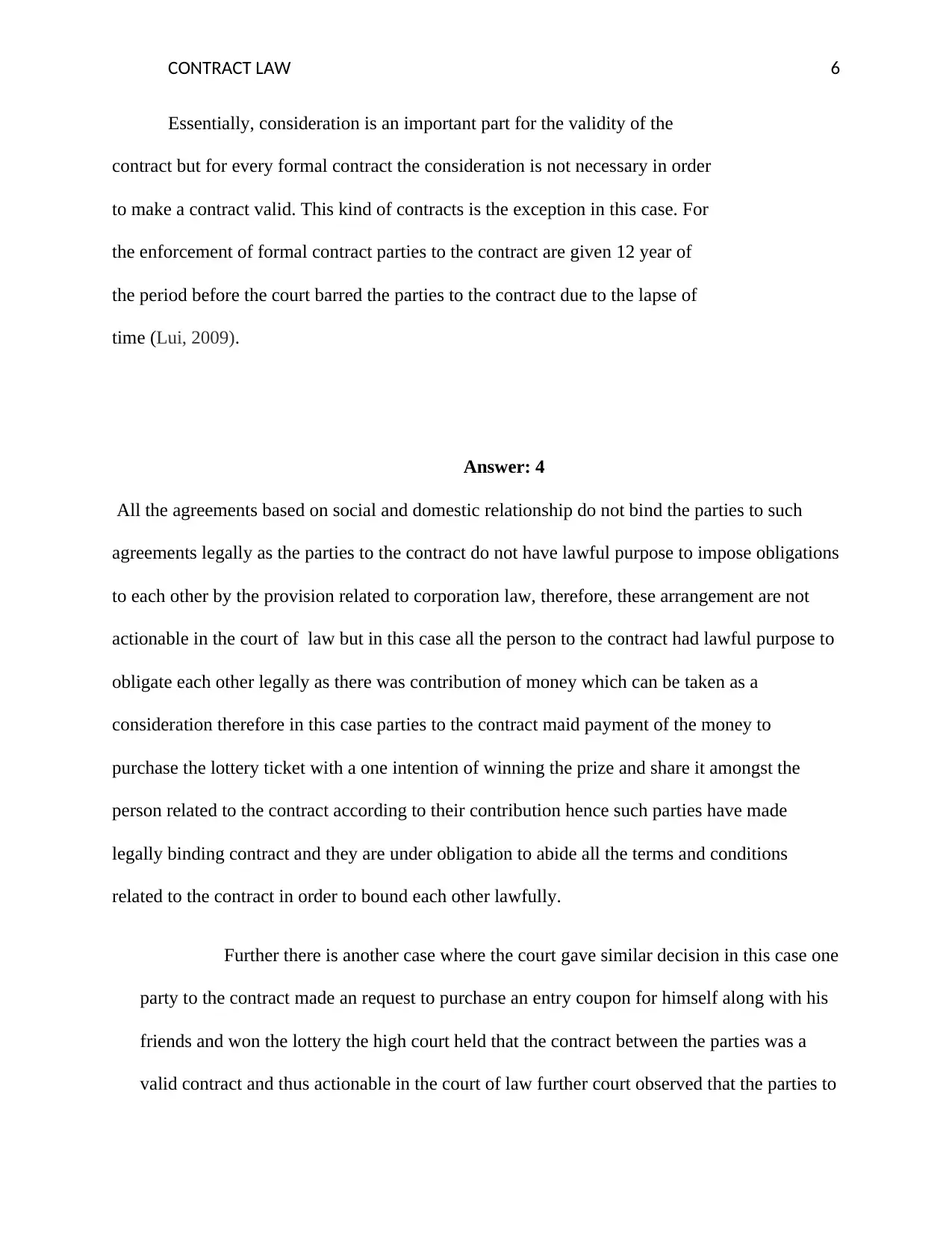
CONTRACT LAW 6
Essentially, consideration is an important part for the validity of the
contract but for every formal contract the consideration is not necessary in order
to make a contract valid. This kind of contracts is the exception in this case. For
the enforcement of formal contract parties to the contract are given 12 year of
the period before the court barred the parties to the contract due to the lapse of
time (Lui, 2009).
Answer: 4
All the agreements based on social and domestic relationship do not bind the parties to such
agreements legally as the parties to the contract do not have lawful purpose to impose obligations
to each other by the provision related to corporation law, therefore, these arrangement are not
actionable in the court of law but in this case all the person to the contract had lawful purpose to
obligate each other legally as there was contribution of money which can be taken as a
consideration therefore in this case parties to the contract maid payment of the money to
purchase the lottery ticket with a one intention of winning the prize and share it amongst the
person related to the contract according to their contribution hence such parties have made
legally binding contract and they are under obligation to abide all the terms and conditions
related to the contract in order to bound each other lawfully.
Further there is another case where the court gave similar decision in this case one
party to the contract made an request to purchase an entry coupon for himself along with his
friends and won the lottery the high court held that the contract between the parties was a
valid contract and thus actionable in the court of law further court observed that the parties to
Essentially, consideration is an important part for the validity of the
contract but for every formal contract the consideration is not necessary in order
to make a contract valid. This kind of contracts is the exception in this case. For
the enforcement of formal contract parties to the contract are given 12 year of
the period before the court barred the parties to the contract due to the lapse of
time (Lui, 2009).
Answer: 4
All the agreements based on social and domestic relationship do not bind the parties to such
agreements legally as the parties to the contract do not have lawful purpose to impose obligations
to each other by the provision related to corporation law, therefore, these arrangement are not
actionable in the court of law but in this case all the person to the contract had lawful purpose to
obligate each other legally as there was contribution of money which can be taken as a
consideration therefore in this case parties to the contract maid payment of the money to
purchase the lottery ticket with a one intention of winning the prize and share it amongst the
person related to the contract according to their contribution hence such parties have made
legally binding contract and they are under obligation to abide all the terms and conditions
related to the contract in order to bound each other lawfully.
Further there is another case where the court gave similar decision in this case one
party to the contract made an request to purchase an entry coupon for himself along with his
friends and won the lottery the high court held that the contract between the parties was a
valid contract and thus actionable in the court of law further court observed that the parties to
Paraphrase This Document
Need a fresh take? Get an instant paraphrase of this document with our AI Paraphraser
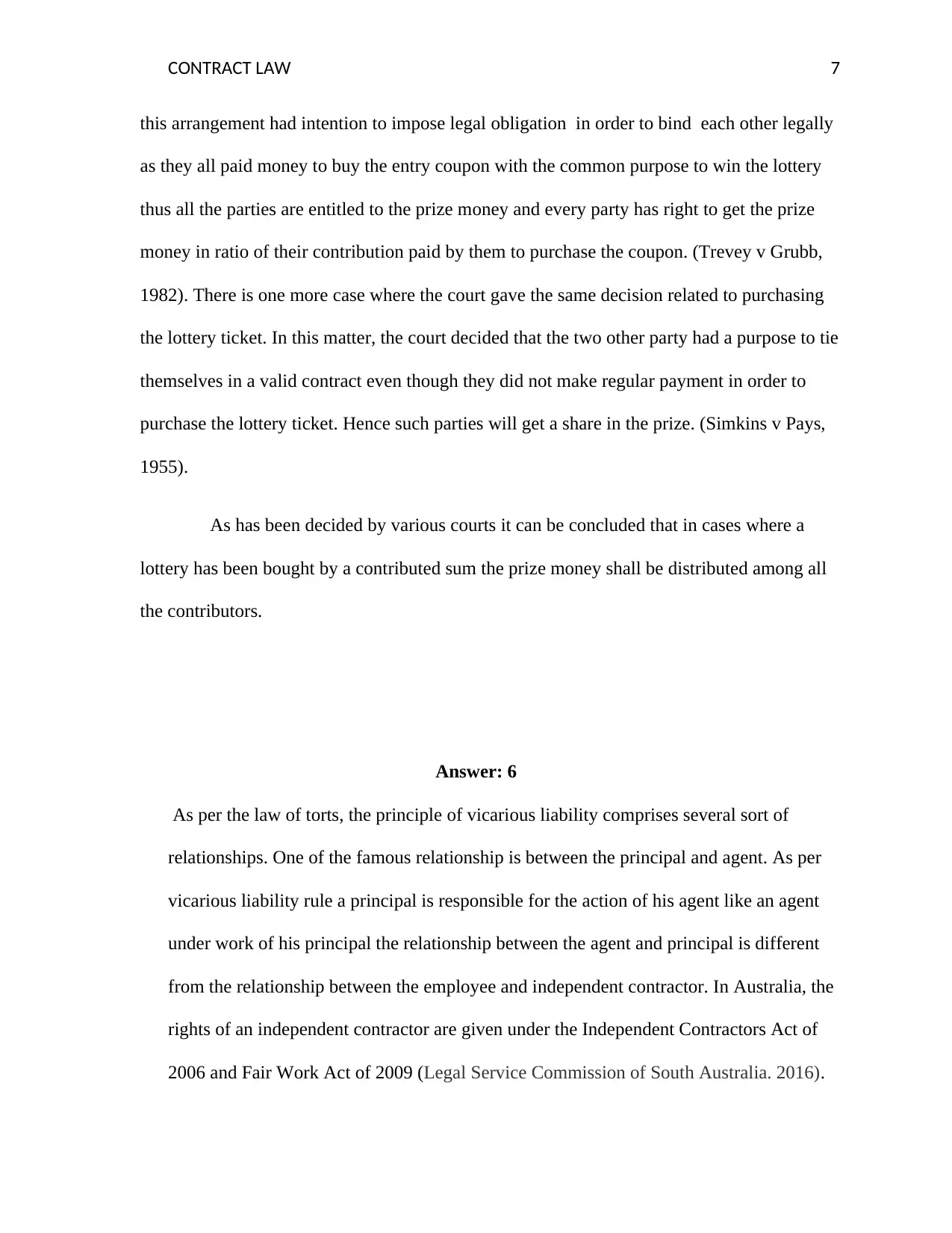
CONTRACT LAW 7
this arrangement had intention to impose legal obligation in order to bind each other legally
as they all paid money to buy the entry coupon with the common purpose to win the lottery
thus all the parties are entitled to the prize money and every party has right to get the prize
money in ratio of their contribution paid by them to purchase the coupon. (Trevey v Grubb,
1982). There is one more case where the court gave the same decision related to purchasing
the lottery ticket. In this matter, the court decided that the two other party had a purpose to tie
themselves in a valid contract even though they did not make regular payment in order to
purchase the lottery ticket. Hence such parties will get a share in the prize. (Simkins v Pays,
1955).
As has been decided by various courts it can be concluded that in cases where a
lottery has been bought by a contributed sum the prize money shall be distributed among all
the contributors.
Answer: 6
As per the law of torts, the principle of vicarious liability comprises several sort of
relationships. One of the famous relationship is between the principal and agent. As per
vicarious liability rule a principal is responsible for the action of his agent like an agent
under work of his principal the relationship between the agent and principal is different
from the relationship between the employee and independent contractor. In Australia, the
rights of an independent contractor are given under the Independent Contractors Act of
2006 and Fair Work Act of 2009 (Legal Service Commission of South Australia. 2016).
this arrangement had intention to impose legal obligation in order to bind each other legally
as they all paid money to buy the entry coupon with the common purpose to win the lottery
thus all the parties are entitled to the prize money and every party has right to get the prize
money in ratio of their contribution paid by them to purchase the coupon. (Trevey v Grubb,
1982). There is one more case where the court gave the same decision related to purchasing
the lottery ticket. In this matter, the court decided that the two other party had a purpose to tie
themselves in a valid contract even though they did not make regular payment in order to
purchase the lottery ticket. Hence such parties will get a share in the prize. (Simkins v Pays,
1955).
As has been decided by various courts it can be concluded that in cases where a
lottery has been bought by a contributed sum the prize money shall be distributed among all
the contributors.
Answer: 6
As per the law of torts, the principle of vicarious liability comprises several sort of
relationships. One of the famous relationship is between the principal and agent. As per
vicarious liability rule a principal is responsible for the action of his agent like an agent
under work of his principal the relationship between the agent and principal is different
from the relationship between the employee and independent contractor. In Australia, the
rights of an independent contractor are given under the Independent Contractors Act of
2006 and Fair Work Act of 2009 (Legal Service Commission of South Australia. 2016).
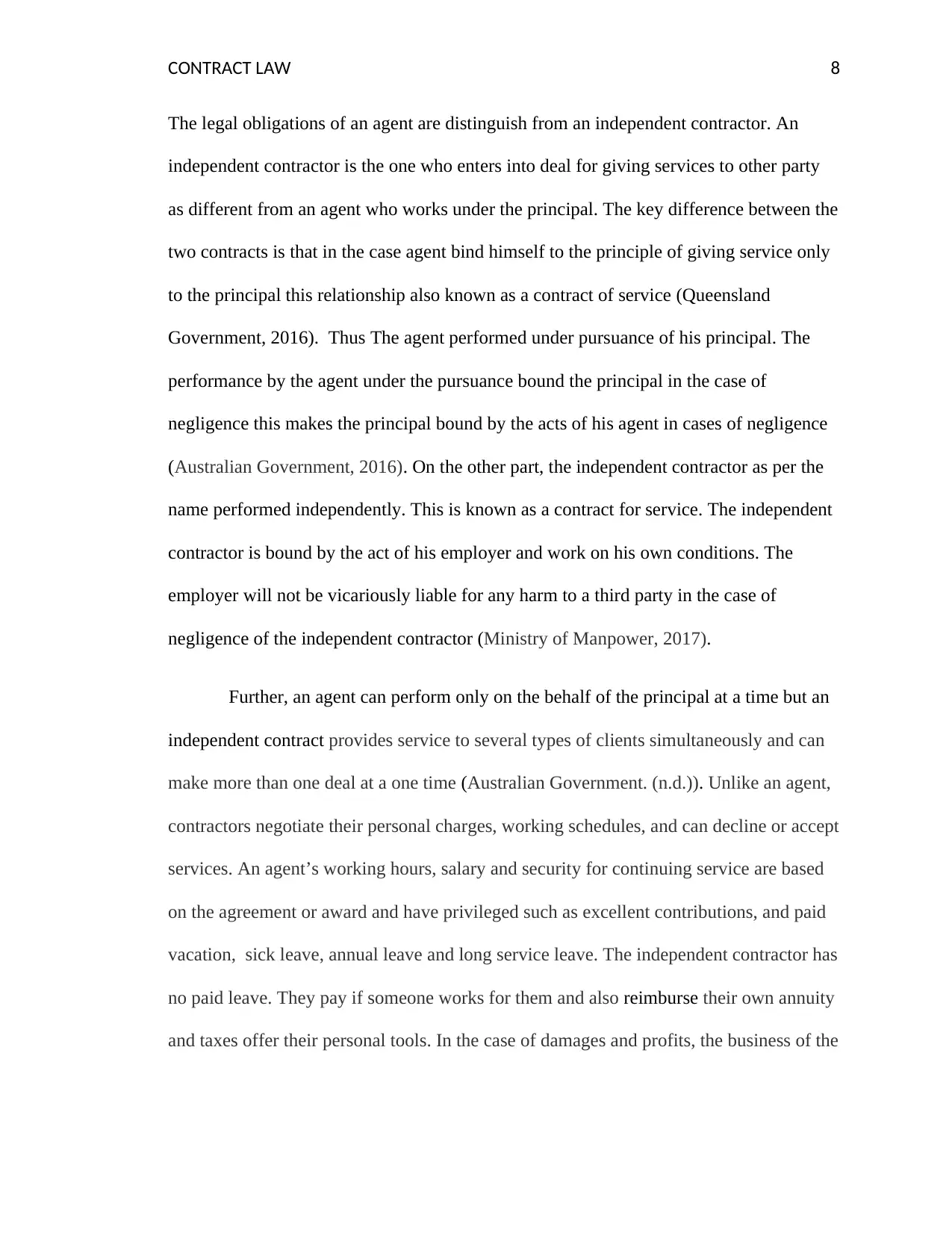
CONTRACT LAW 8
The legal obligations of an agent are distinguish from an independent contractor. An
independent contractor is the one who enters into deal for giving services to other party
as different from an agent who works under the principal. The key difference between the
two contracts is that in the case agent bind himself to the principle of giving service only
to the principal this relationship also known as a contract of service (Queensland
Government, 2016). Thus The agent performed under pursuance of his principal. The
performance by the agent under the pursuance bound the principal in the case of
negligence this makes the principal bound by the acts of his agent in cases of negligence
(Australian Government, 2016). On the other part, the independent contractor as per the
name performed independently. This is known as a contract for service. The independent
contractor is bound by the act of his employer and work on his own conditions. The
employer will not be vicariously liable for any harm to a third party in the case of
negligence of the independent contractor (Ministry of Manpower, 2017).
Further, an agent can perform only on the behalf of the principal at a time but an
independent contract provides service to several types of clients simultaneously and can
make more than one deal at a one time (Australian Government. (n.d.)). Unlike an agent,
contractors negotiate their personal charges, working schedules, and can decline or accept
services. An agent’s working hours, salary and security for continuing service are based
on the agreement or award and have privileged such as excellent contributions, and paid
vacation, sick leave, annual leave and long service leave. The independent contractor has
no paid leave. They pay if someone works for them and also reimburse their own annuity
and taxes offer their personal tools. In the case of damages and profits, the business of the
The legal obligations of an agent are distinguish from an independent contractor. An
independent contractor is the one who enters into deal for giving services to other party
as different from an agent who works under the principal. The key difference between the
two contracts is that in the case agent bind himself to the principle of giving service only
to the principal this relationship also known as a contract of service (Queensland
Government, 2016). Thus The agent performed under pursuance of his principal. The
performance by the agent under the pursuance bound the principal in the case of
negligence this makes the principal bound by the acts of his agent in cases of negligence
(Australian Government, 2016). On the other part, the independent contractor as per the
name performed independently. This is known as a contract for service. The independent
contractor is bound by the act of his employer and work on his own conditions. The
employer will not be vicariously liable for any harm to a third party in the case of
negligence of the independent contractor (Ministry of Manpower, 2017).
Further, an agent can perform only on the behalf of the principal at a time but an
independent contract provides service to several types of clients simultaneously and can
make more than one deal at a one time (Australian Government. (n.d.)). Unlike an agent,
contractors negotiate their personal charges, working schedules, and can decline or accept
services. An agent’s working hours, salary and security for continuing service are based
on the agreement or award and have privileged such as excellent contributions, and paid
vacation, sick leave, annual leave and long service leave. The independent contractor has
no paid leave. They pay if someone works for them and also reimburse their own annuity
and taxes offer their personal tools. In the case of damages and profits, the business of the
⊘ This is a preview!⊘
Do you want full access?
Subscribe today to unlock all pages.

Trusted by 1+ million students worldwide

CONTRACT LAW 9
independent contract directly impacted whereas an agent will not pay if any person does
work on their behalf. And their all tax will be deducted by their principle.
independent contract directly impacted whereas an agent will not pay if any person does
work on their behalf. And their all tax will be deducted by their principle.
Paraphrase This Document
Need a fresh take? Get an instant paraphrase of this document with our AI Paraphraser
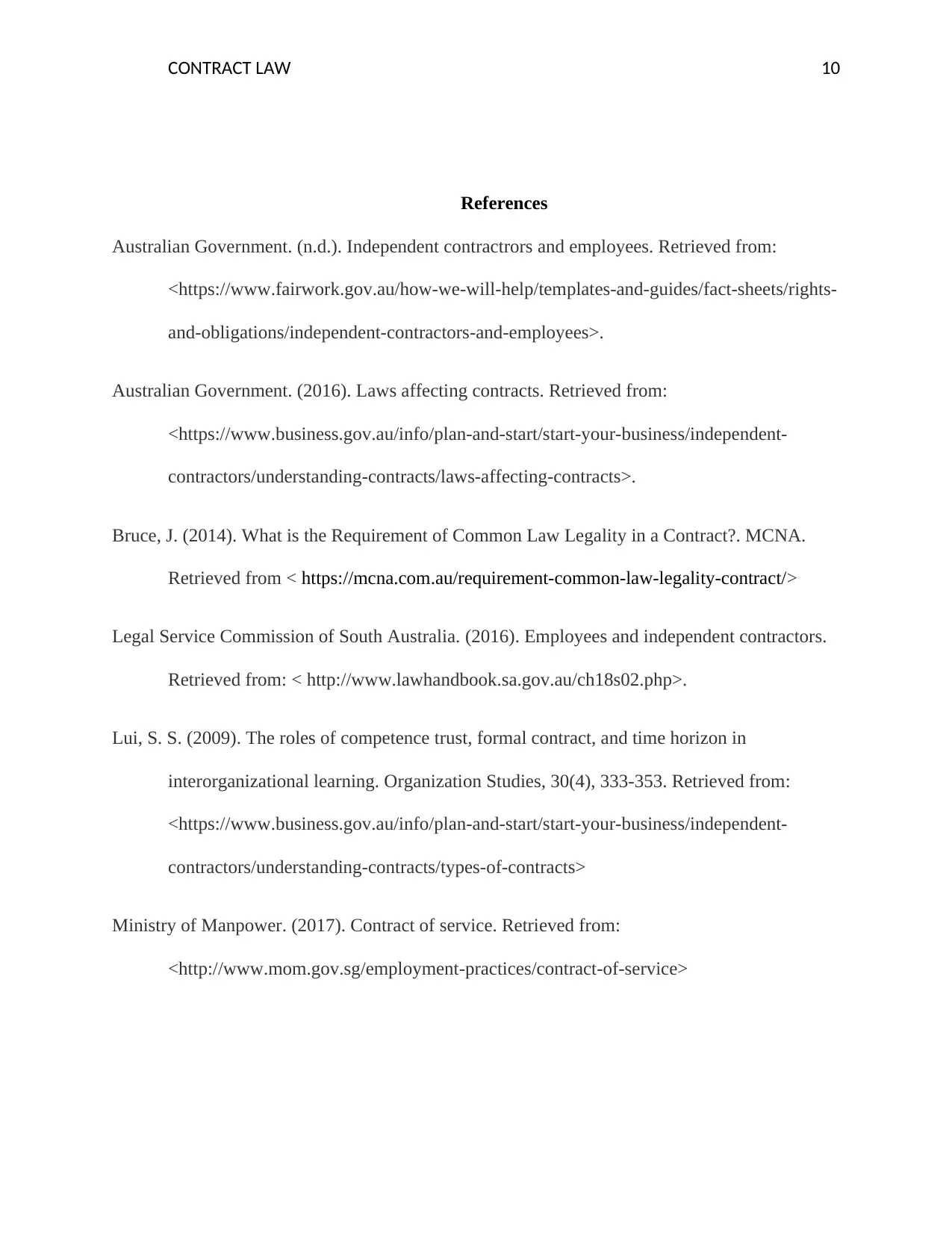
CONTRACT LAW 10
References
Australian Government. (n.d.). Independent contractrors and employees. Retrieved from:
<https://www.fairwork.gov.au/how-we-will-help/templates-and-guides/fact-sheets/rights-
and-obligations/independent-contractors-and-employees>.
Australian Government. (2016). Laws affecting contracts. Retrieved from:
<https://www.business.gov.au/info/plan-and-start/start-your-business/independent-
contractors/understanding-contracts/laws-affecting-contracts>.
Bruce, J. (2014). What is the Requirement of Common Law Legality in a Contract?. MCNA.
Retrieved from < https://mcna.com.au/requirement-common-law-legality-contract/>
Legal Service Commission of South Australia. (2016). Employees and independent contractors.
Retrieved from: < http://www.lawhandbook.sa.gov.au/ch18s02.php>.
Lui, S. S. (2009). The roles of competence trust, formal contract, and time horizon in
interorganizational learning. Organization Studies, 30(4), 333-353. Retrieved from:
<https://www.business.gov.au/info/plan-and-start/start-your-business/independent-
contractors/understanding-contracts/types-of-contracts>
Ministry of Manpower. (2017). Contract of service. Retrieved from:
<http://www.mom.gov.sg/employment-practices/contract-of-service>
References
Australian Government. (n.d.). Independent contractrors and employees. Retrieved from:
<https://www.fairwork.gov.au/how-we-will-help/templates-and-guides/fact-sheets/rights-
and-obligations/independent-contractors-and-employees>.
Australian Government. (2016). Laws affecting contracts. Retrieved from:
<https://www.business.gov.au/info/plan-and-start/start-your-business/independent-
contractors/understanding-contracts/laws-affecting-contracts>.
Bruce, J. (2014). What is the Requirement of Common Law Legality in a Contract?. MCNA.
Retrieved from < https://mcna.com.au/requirement-common-law-legality-contract/>
Legal Service Commission of South Australia. (2016). Employees and independent contractors.
Retrieved from: < http://www.lawhandbook.sa.gov.au/ch18s02.php>.
Lui, S. S. (2009). The roles of competence trust, formal contract, and time horizon in
interorganizational learning. Organization Studies, 30(4), 333-353. Retrieved from:
<https://www.business.gov.au/info/plan-and-start/start-your-business/independent-
contractors/understanding-contracts/types-of-contracts>
Ministry of Manpower. (2017). Contract of service. Retrieved from:
<http://www.mom.gov.sg/employment-practices/contract-of-service>
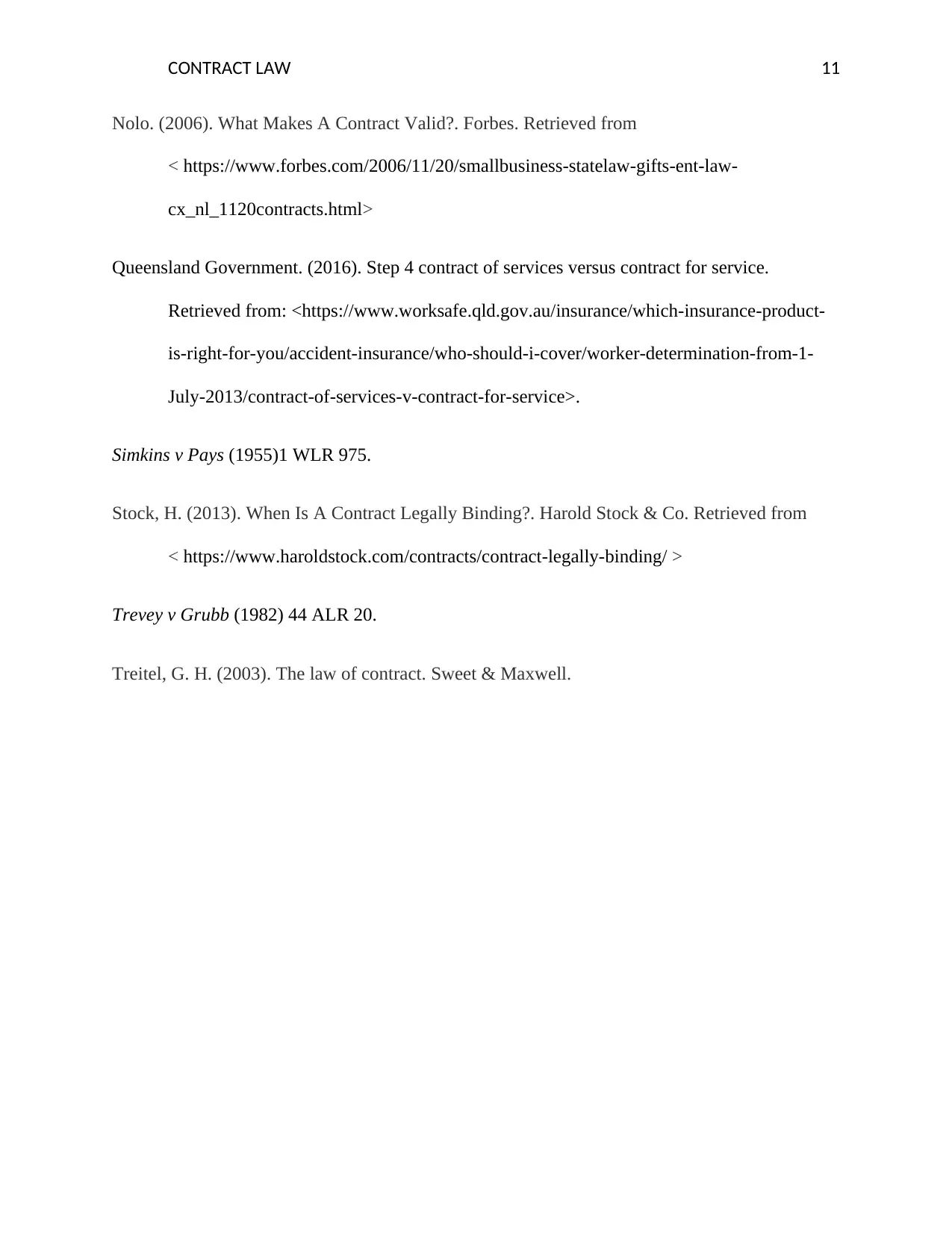
CONTRACT LAW 11
Nolo. (2006). What Makes A Contract Valid?. Forbes. Retrieved from
< https://www.forbes.com/2006/11/20/smallbusiness-statelaw-gifts-ent-law-
cx_nl_1120contracts.html>
Queensland Government. (2016). Step 4 contract of services versus contract for service.
Retrieved from: <https://www.worksafe.qld.gov.au/insurance/which-insurance-product-
is-right-for-you/accident-insurance/who-should-i-cover/worker-determination-from-1-
July-2013/contract-of-services-v-contract-for-service>.
Simkins v Pays (1955)1 WLR 975.
Stock, H. (2013). When Is A Contract Legally Binding?. Harold Stock & Co. Retrieved from
< https://www.haroldstock.com/contracts/contract-legally-binding/ >
Trevey v Grubb (1982) 44 ALR 20.
Treitel, G. H. (2003). The law of contract. Sweet & Maxwell.
Nolo. (2006). What Makes A Contract Valid?. Forbes. Retrieved from
< https://www.forbes.com/2006/11/20/smallbusiness-statelaw-gifts-ent-law-
cx_nl_1120contracts.html>
Queensland Government. (2016). Step 4 contract of services versus contract for service.
Retrieved from: <https://www.worksafe.qld.gov.au/insurance/which-insurance-product-
is-right-for-you/accident-insurance/who-should-i-cover/worker-determination-from-1-
July-2013/contract-of-services-v-contract-for-service>.
Simkins v Pays (1955)1 WLR 975.
Stock, H. (2013). When Is A Contract Legally Binding?. Harold Stock & Co. Retrieved from
< https://www.haroldstock.com/contracts/contract-legally-binding/ >
Trevey v Grubb (1982) 44 ALR 20.
Treitel, G. H. (2003). The law of contract. Sweet & Maxwell.
⊘ This is a preview!⊘
Do you want full access?
Subscribe today to unlock all pages.

Trusted by 1+ million students worldwide
1 out of 12
Related Documents
Your All-in-One AI-Powered Toolkit for Academic Success.
+13062052269
info@desklib.com
Available 24*7 on WhatsApp / Email
![[object Object]](/_next/static/media/star-bottom.7253800d.svg)
Unlock your academic potential
Copyright © 2020–2026 A2Z Services. All Rights Reserved. Developed and managed by ZUCOL.




